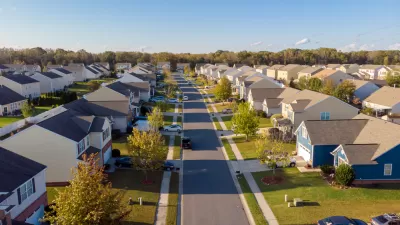The supply gap is hitting lower-income families especially hard, a new study shows.

Lower-income family households face the most challenges in finding appropriate rental housing, according to a new paper from the Joint Center for Housing Studies at Harvard. Researchers Whitney Airgood-Obrycki and Jennifer Molinsky assessed housing based on affordability, size, and availability. They find that the biggest supply gap—the difference between the number of households needing housing and the number of available units—is for extremely low-income families, particularly those looking for two-bedroom units.
All regions in the country have a supply gap, with the largest gap located in the West. When examining four metropolitan areas, the researchers find that Boston and Chicago have smaller gaps in affordable housing supply than Los Angeles and Atlanta. They also report that single-family rentals are an important source of housing, making up 20 percent of affordable and available housing for lower-income families.
Increasing the low-income rental housing supply is essential, along with expansion of federal rental assistance programs for families, say Airgood-Obrycki and Molinsky. "At the local level, communities that have inclusionary housing programs might consider requiring that a certain share of units be sized for families. Municipalities might also evaluate whether putting resources into affordable housing for students or young professionals would reduce some of the competition for family-friendly rental housing."
FULL STORY: AMERICAN FAMILIES CAN’T AFFORD THE RENT

Planetizen Federal Action Tracker
A weekly monitor of how Trump’s orders and actions are impacting planners and planning in America.

Maui's Vacation Rental Debate Turns Ugly
Verbal attacks, misinformation campaigns and fistfights plague a high-stakes debate to convert thousands of vacation rentals into long-term housing.

Restaurant Patios Were a Pandemic Win — Why Were They so Hard to Keep?
Social distancing requirements and changes in travel patterns prompted cities to pilot new uses for street and sidewalk space. Then it got complicated.

In California Battle of Housing vs. Environment, Housing Just Won
A new state law significantly limits the power of CEQA, an environmental review law that served as a powerful tool for blocking new development.

Boulder Eliminates Parking Minimums Citywide
Officials estimate the cost of building a single underground parking space at up to $100,000.

Orange County, Florida Adopts Largest US “Sprawl Repair” Code
The ‘Orange Code’ seeks to rectify decades of sprawl-inducing, car-oriented development.
Urban Design for Planners 1: Software Tools
This six-course series explores essential urban design concepts using open source software and equips planners with the tools they need to participate fully in the urban design process.
Planning for Universal Design
Learn the tools for implementing Universal Design in planning regulations.
Heyer Gruel & Associates PA
JM Goldson LLC
Custer County Colorado
City of Camden Redevelopment Agency
City of Astoria
Transportation Research & Education Center (TREC) at Portland State University
Jefferson Parish Government
Camden Redevelopment Agency
City of Claremont





























